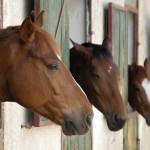Controlling Large Strongyles in Horses

Strongyle parasites are common equine parasites, and are traditionally subdivided into large and small strongyles. Larvae of large strongyles (Strongylus vulgaris) migrate through the arteries of the mesentery (the membrane that supports the intestines), and disruptions of blood flow can cause colic and tissue death, sometimes with fatal results. Fortunately, large strongyles have become rare in managed horse populations.
Two methods of combating strongyles have found favor with horse owners. The traditional method is to deworm all horses on a property at regular intervals. This method greatly reduces parasite numbers, but by selecting for resistant strongyles, it can eventually eliminate susceptible worms and build a population of strongyles that can’t be killed by available deworming preparations.
The selective method to strongyle control is to perform fecal egg counts on all horses on a property, deworming only those with a heavy load of parasites. Though almost all horses will have some level of parasites, there are usually only a few horses with high strongyle counts, so this method saves money and slows the march toward resistant organisms. This method is widely recommended, but it has been questioned whether it provides adequate control over the more damaging large strongyles.
Martin Nielsen, assistant professor at the Gluck Equine Research Center at the University of Kentucky, studied 991 horses from 53 farms, some in Kentucky and some in Denmark. He found that in Denmark, where selective parasite control is used most often, 12% of horses had infections with S. vulgaris. In Kentucky, where horses are more often dewormed on a traditional schedule, no horses were found to have large strongyles. However, routine deworming of all horses is thought to have contributed to the rise in resistant strains of the more commonly found small strongyles and roundworms. Large strongyles have not yet shown resistance to deworming products.
Nielsen pointed out that each method of controlling strongyles has advantages and disadvantages. He recommends a schedule of one or two yearly dewormings for all horses, augmenting with additional selective treatments for horses that need them. Further, he recommends testing for resistance to dewormers on every property each year.








